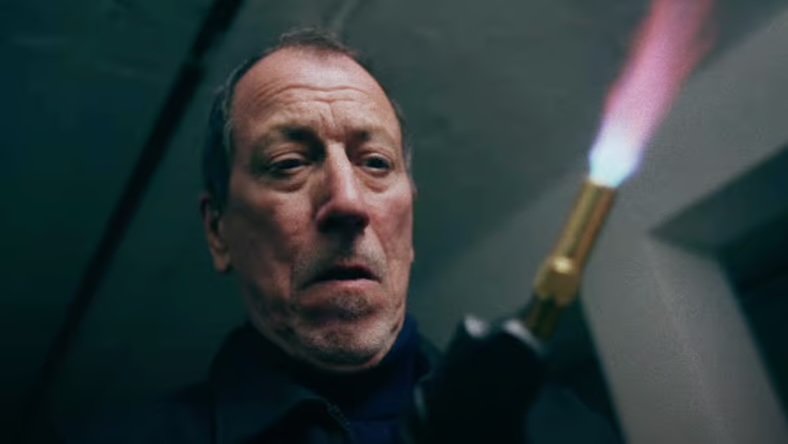Dead Mail, directed by Joe DeBoer and Kyle McConaghy, is a gripping and unique addition to the horror-thriller genre, weaving together elements of suspense, dark comedy, and a hefty dose of '80s nostalgia. Premiering exclusively on Shudder as part of their Halfway to Halloween celebration, the film brings a chilling, analog-inspired atmosphere that immediately draws the viewer into its unsettling world.
The plot begins with a blood-stained cry for help that makes its way to Jasper (Tomas Boykin), a seasoned 'dead letter' investigator at a post office in rural 1980s America. What starts as a mysterious, almost mundane quest to trace the origins of a letter quickly spirals into a violent and bizarre journey involving a kidnapped keyboard engineer and his eccentric associate. The narrative is intriguing from the start, providing a fresh take on the genre with a deep dive into the strange and often overlooked world of postal service bureaucracy.
The film’s greatest strength lies in its atmospheric approach—visually, Dead Mail embraces a grainy, analog aesthetic that feels like a love letter to '80s thrillers, complete with synthesizers and period-accurate details in both the sets and costumes. The grainy look, akin to shooting on 16mm film, gives the movie a retro feel that complements its slow-burn tension. This is an era that feels both nostalgic and eerie, and the film cleverly uses it to heighten its unsettling narrative.
The cast is strong, with standout performances from Tomas Boykin as Jasper, whose quiet determination and vulnerability make him an extremely compelling character. His journey is one that immediately draws the audience in, and by the end, it’s clear that Dead Mail has only scratched the surface of his complex backstory—here’s hoping for a prequel to explore what led him to this point. Sterling Macer Jr. as Josh and John Fleck as Trent also offer solid performances, each bringing depth to characters who might have been otherwise one-dimensional.
One of the most captivating elements of Dead Mail is its narrative structure, which offers multiple viewpoints, enhancing the film’s mystery-solving aspect. The story weaves in and out of different perspectives, which gives it a layered feel, and the pacing, though deliberate, keeps the audience engaged. The film’s villain—delivering monologues reminiscent of Saw’s John Kramer—adds a layer of tension that continually builds throughout the runtime. His philosophical musings on trust, partnerships, and the disintegration of human connection are both chilling and thought-provoking.
The film’s score, filled with eerie synthesizer tracks, amplifies the dread and is an essential part of its immersive experience. The sound design also stands out, particularly in scenes that emphasize the sounds of whispers, echoes, and the unnerving hum of the postal department—adding to the overall feeling of unease.
While Dead Mail may not entirely reinvent the wheel when it comes to its premise, it is a solid thriller that offers a unique narrative and a thoughtful exploration of friendship, trust, and the concept of 'dead letters'—literally and metaphorically. The film has a touch of Wes Anderson’s quirky visual style in the way it balances strange, offbeat moments with serious, dramatic ones.
In conclusion, Dead Mail is a thrilling, oddly charming film that brings something fresh to the table for fans of '80s-inspired horror. Its eerie, retro vibe, combined with solid performances and a compelling mystery, makes it a standout film in Shudder’s lineup. Whether you're a fan of the genre or just looking for something different, Dead Mail offers a dark, strange, and ultimately satisfying ride.
Jessie Hobson






